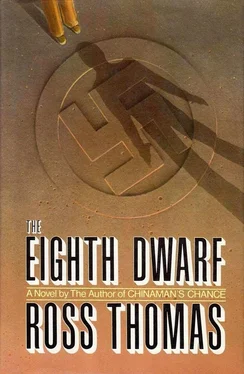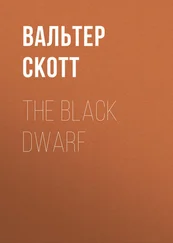The rear entrance to the DP camp wasn’t really a rear entrance. Even a fairly close inspection would not have revealed the cleverly cut high steel-mesh fence that was rolled back to let Oppenheimer drive the jeep through. The DP’s were not prisoners at the Badenhausen camp, and the jeep could just as easily have been driven through the main entrance. But then some of the UNRRA officials might have seen it and started asking questions. Whether other DP’s saw it didn’t matter. Nearly everyone had his own fiddle going, in most cases it was common knowledge, and informers were dealt with by being informed on. If that didn’t work, there were always the three Poles who, for a fair price, would administer a sound beating.
After the Greek and the Latvian rolled the fence back into place, Oppenheimer got out of the jeep without a word and headed for the small shed that housed the operations of Kubista the Czech. Although Oppenheimer heard the jeep when they started the engine and drove it off, he gave it no farewell glance. For Oppenheimer, that part of his life was over. Now he would become someone else, and already he was ridding himself of the Americanisms he had so carefully acquired.
Oppenheimer smiled slightly as he remembered the young American Corporal’s almost interminable, sometimes sympathetic, and always naive questions as they had driven away from the Opel plant. Oppenheimer had answered most of them with questions of his own.
Are you really an American, sir? Could an American have done what I did? Sir, do you mind if I ask you how you felt when you did it? Is it always necessary to feel something, Corporal? Was that the first time you ever did anything like that, sir? Shouldn’t your question really be whether it will be the last time? You mean you’re going to do it again, sir? I don’t know, Corporal; should I? Do you mind if I ask you this, Lieutenant? Do you sort of think of yourself as a kind of avenging angel? I’m not sure that I believe in angels anymore, Corporal. Do you?
And then there had been the final question when, six miles away from the Opel plant, Oppenheimer had stopped the jeep to let Corporal Little out.
“I don’t know how to ask this one, sir,” Corporal Little had said as he got out from behind the wheel and Oppenheimer slid over under it.
“You mean am I crazy?”
“Well, yes, sir, that’s kind of what I had in mind.”
“As a bedbug,” Oppenheimer had said, remembering one of Sergeant Packer’s expressions.
Little had nodded thoughtfully as if that were just the answer he had wanted.
“Well, hell, sir, good luck, I guess.”
“Why, thank you, Corporal. Thank you very much.”
Oppenheimer knocked on the door of the shed and went in after the voice in German said, “Enter.” Inside, the room seemed to be half jumble sale and half printing plant. Several metal bins lined one wall. They were filled with civilian clothing — suit coats, pants, vests, and shoes — none of which seemed to match. One bin was filled with nothing but men’s hats. Near the bins on a wooden pole hung an assortment of U.S. Army uniforms — Eisenhower jackets, officer’s pinks, trench coats, field jackets, leather flying jackets, fatigues, OD’s, and even two WAC uniforms.
The wooden pole hung with Army garments more or less divided the jumble sale from the printing operation, which was composed of a small hand press, paper of various weights and qualities, and a wide assortment of rubber stamps. Samples of some of the hand press’s legitimate efforts were tacked up on the walls: mostly official camp regulations and proclamations.
Next to the engraving bench sat Kubista the Czech, the camp printer, clothing merchant, and master forger. He was a gaunt man of average height who just escaped being emaciated. He looked up when Oppenheimer came in; nodded his long, narrow head; and said, “I see we have demoted ourselves to lieutenant.”
“It makes a change,” Oppenheimer said. “I shall miss being an American officer. It was a rather carefree life.”
“I have your new life here for you,” Kubista said, reached into a drawer, and brought out a small stack of wallet-size documents. He dealt them off one by one. “Your basic identification card, of course; your interzonal pass; your British Zone ration books; rent receipts; some wartime odds and ends that could be useful for verisimilitude; and three letters from your lover, who lives in Berlin and misses you rather desperately.”
Oppenheimer went through the documents one by one. He smiled at his new name. “Ekkehard Fink. The finch. Did you know that Fink has a rather unpleasant connotation in English?”
“No.”
“It means informer, I think.”
“I must remember that. There are many around here to whom it could be applied.”
“Probably.”
“Even I have been tempted.”
“Oh?”
“Twice recently. Here,” he said, rising and taking a dark blue suit from a nail. “Try this on. Over there on the chair are a shirt, tie, shoes, and the rest of it. We’ll pick you out a hat and overcoat later.”
Oppenheimer started removing his uniform. “Tell me about your temptation.”
Kubista reached into his pocket and brought out a pack of Chesterfields. He lit one, inhaled deeply, blew the smoke out, and looked at his cigarette with pleasure. He had deep-set, moist brown eyes that stared out from behind thick, wire-framed spectacles. What was left of his hair was white. His nose was long and thin and wandered a bit where it had been broken by a camp guard in 1942. He had an old man’s sunken mouth which caved in on itself because most of his teeth were missing. He looked sixty. He was thirty-eight.
“What an indescribable luxury is American tobacco.”
“One of the few currencies that can be either consumed or spent with equal pleasure,” Oppenheimer said. “Tell me about your temptation.”
“Yes, that. The first occurred yesterday morning. A German. He came to buy a bicycle, and after he found one that suited him he made very discreet inquiries about obtaining documents and was directed to me. It turned out that he was a printer — and a good one, if I’m any judge. We had quite a nice little chat. He claimed to be looking for a long-lost brother. Younger brother. It seemed that he had heard that this young brother, a bad sort, was posing as an American officer. My new printer friend wanted to find him and put him on the path to righteousness and redemption. I didn’t believe him for a second, and he didn’t expect me to. He did mention a sum of money. Quite a nice sum. He seemed rather well off, did my printer friend.”
Oppenheimer finished knotting his tie. “What did you reply?”
“I told him I would have to ask around. He said he would be back tomorrow.”
“And the second tempter?”
“Ach, that one. Well, he’s one of us. A thief. Quite a good one, as a matter of fact. He’s a Romanian who pretends to be an Estonian. He made no bones about whom he was looking for — an American officer who recently might have bought himself some new identifications. He also mentioned a sum of money, although he was not nearly so generous as the printer. I told him the same thing. That I would make inquiries.”
Oppenheimer nodded and slipped on the suit coat. “Too bad you don’t have a mirror.”
“You look very nice,” Kubista said. “Poor but respectable.”
“I turned the jeep over to your associates.”
“Excellent.”
“And then there is this.” He opened the palm of his hand. In it lay a diamond, slightly more than a carat in weight.
“Well,” Kubista said, picking up the stone and holding it up to the light. “I was not expecting this.”
“I am hoping that it will buy silence,” Oppenheimer said. “Not total silence, only partial silence.”
Читать дальше












